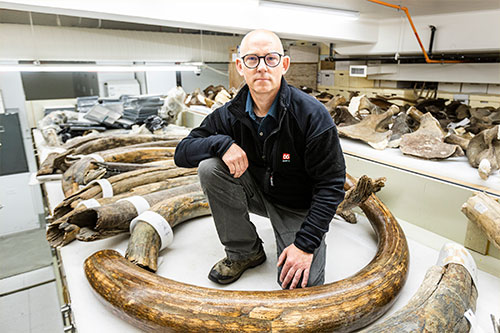Matthew Wooller kneels among the mammoth tusk collection at the University of Alaska Museum of the North in 2021. Wooller is leading the museum's Adopt a Mammoth program, which will date and identify specimens at the museum. |
The larger goal is to find the “youngest” mammoth — a specimen from 10,000 years ago or more recent. This would extend the date of extinction on the mainland to a period well after the earliest people arrived in Interior Alaska.
“That would be a real change in understanding how these animals existed,” said Patrick Druckenmiller, the museum’s director. “It would be pretty amazing to have this huge and unique data set.”
Only a small number of mammoth specimens in the museum’s collection are currently dated.
The “youngest” dated mammoth in mainland Alaska so far is about 11,600 years old, but there are reasons to believe the massive animals were around more recently. A remnant population on neighboring St. Paul Island survived until about 5,600 years ago.
Participants in the Adopt a Mammoth program will receive a photo of their specimen, updates on testing and a chance to name the fossil. When testing is complete, the donor with the youngest fossil will receive a trophy. The winner also can appear in a photo with their specimen in the museum during the announcement period.
“It’s a fun philanthropic project, but it’s also rooted in solid science,” said Matthew Wooller, the director of UAF’s Alaska Stable Isotope Facility and the leader of the Adopt a Mammoth project. “If we find a young mammoth fossil on the mainland, that’s big news.”
Find more information about the program on the Adopt a Mammoth program website.
| This article is provided as a public service by the University of Alaska, Museum of the North. Jeff Richardson [jarichardson6@alaska.edu] is a science writer with the Museum of the North. |
Representations of fact and opinions in comments posted are solely those of the individual posters and do not represent the opinions of Sitnews.
Send a letter to the editor@sitnews.us
SitNews ©2022
Stories In The News
Ketchikan, Alaska
Articles & photographs that appear in SitNews are considered protected by copyright and may not be reprinted without written permission from and payment of any required fees to the proper freelance writers and subscription services.
E-mail your news & photos to editor@sitnews.us
Photographers choosing to submit photographs for publication to SitNews are in doing so granting their permission for publication and for archiving. SitNews does not sell photographs. All requests for purchasing a photograph will be emailed to the photographer.

